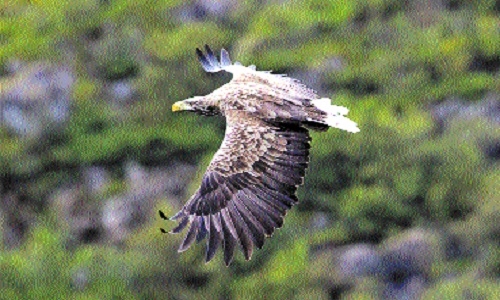Kerwa Breeding Centre’s vultures to be released with transmission device
| Date :14-Feb-2023 |

By Ankita Garg
The Madhya Pradesh Forest Department is all set to release 40 vultures with satellite transmission device for proper monitoring. Around 25 vultures in Panna Tiger Reserve, including critically endangered Indian vultures, were geotagged for monitoring the behaviour of species. Now, experts are set to make study on vultures of Kerwa Breeding Centre.
A team will be keeping an eye on movement of vultures after releasing them in Chhatarpur. After making study of these 40 vultures, 75 vultures born in Kerwa Breeding Centre will be released. Bombay Natural History Society (BNHS) working for Central Environment Ministry has given its final consent for the same. In first phase, rare long willed vulture and white becked vultures born with artificial rear handling at Van Vihar breeding centre will be released in natural habitat.
Officials said that movement of vultures are being monitored in Panna National Park for past one and half years. Many radio transmissions have stopped working and many other issues are being reported. Concerned over the problems, BNHS scientists have decided to make study on few vultures of Chattarpur with satellite transmission before releasing the Kerwa Breeding Centre vultures. Scientists said that after birth of vultures, they conduct its DNA test. They focus on male and female vulture breed as they should be sibling or from same family. Van Vihar Vulture Breeding Centre is spending around 80,000 annually on one vulture.
There is a high cage in breeding centre that gives complete feel of natural sky to the birds. Dr Vibhas Pandav, Director BNHS, said that a survey was conducted in year 2016-17 at breeding centres in Madhya Pradesh, Haryana, Punjab, Himachal, Chandigarh sates. In the study it was found that use of in toxic medicines have spoiled the kidney of vultures.
